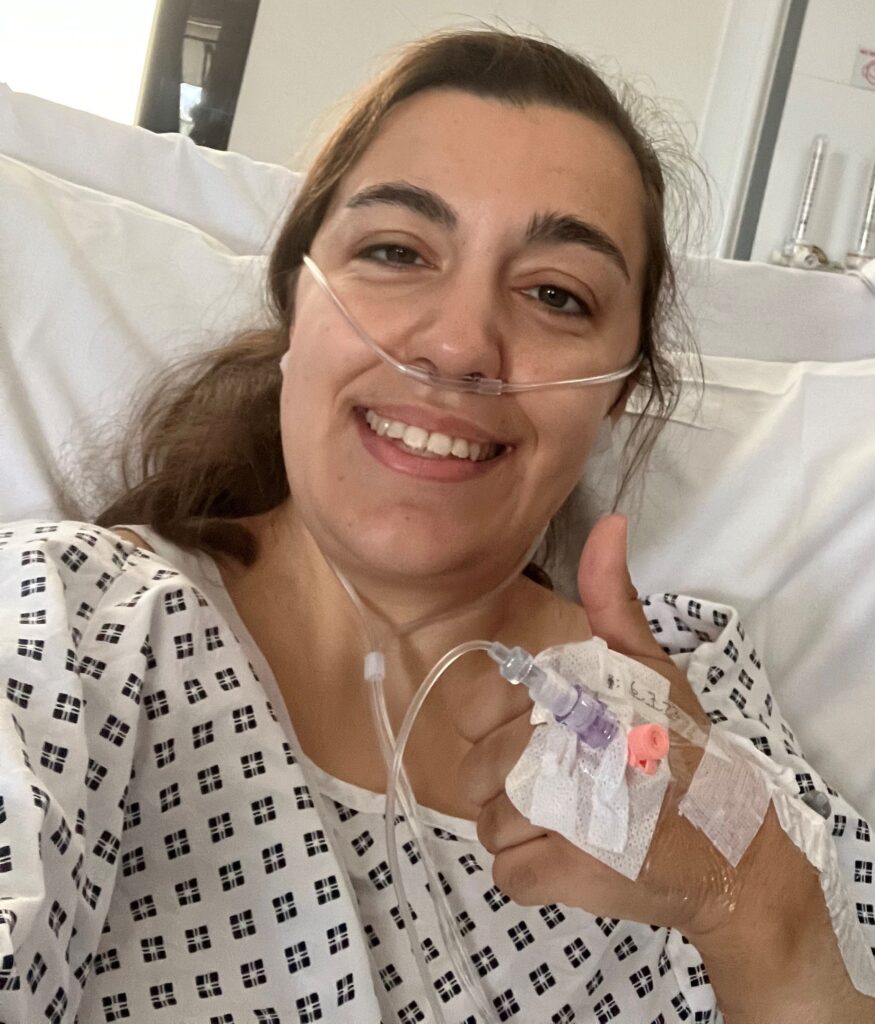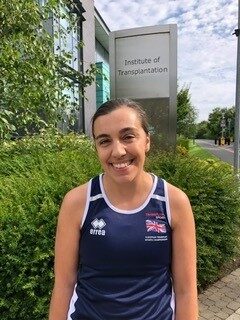Georgia Wilding is a transplant nurse at the Freeman Hospital who gave one of her kidneys to an anonymous recipient last year.
The 31-year-old was inspired to donate her kidney after her cousin Jamie Wilding underwent two liver transplants as a child.
“He sadly died from heart failure at the age of 30, he was a big part of my inspiration to donate a kidney.”
Georgia has worked in the Institute of Transplantation at the Freeman for ten years and seen first-hand the life changing impact of organ donation.
“I already knew about transplants, then I did my placement there as a nursing student and loved it, so I carried on and got a job on the adult high dependency transplant ward.”
She added: “I thought about donating for quite a while and went to see one of the transplant coordinators. She shared concerns about my age, plus we were in lockdown in the Covid pandemic in 2020. It’s their job to spell out the risks and they can’t encourage you, but I was adamant I wanted to do this for someone.”
The minimum age for organ donors varies between centres and some set a minimum threshold of 30-years-old. Having one kidney instead of two, can increase the risk of pre-eclampsia in pregnancy, given Georgia doesn’t yet have children and would potentially like to one day, her risk was calculated.
After a long nine-month assessment process she was accepted by Guy’s Hospital in London.
“Your kidney is quite straight forward to transplant. One kidney picks up the function of the other, just not quite to 100%. My increased risk of preeclampsia was only a one percent increase.”
Altruistic non-direct donors are put into the kidney sharing scheme.
“I delayed mine slightly to do the Rome Marathon, then I went onto the sharing scheme. I went into a chain and my kidney went to a recipient who didn’t have a donor.”
Despite the impact of what she was doing, Georgia wasn’t nervous about the operation or health consequences, only the risk of cancellation which was very real during the pandemic.
“It can be cancelled right up until you are in theatre. I had to wait until the morning of the operation for confirmation it was going ahead.
“I had a week off work to isolate during the pandemic to ensure I was free from Covid, and then travelled down to London for the operation. You’ve done it all, put the effort in. I know there are times when it does get cancelled so I was nervous about that.”
Georgia underwent the procedure at Guy’s Hospital which took about three hours.
“I went to recovery for 45 minutes then back to the ward. My kidney was transported by road and transplanted into the recipient straight away.”

Georgia was in hospital for three nights and returned home to begin her recovery. She was readmitted to the Freeman Hospital transplant ward for six days and has gone on to make a speedy recovery.
“I think it changes things when you’ve been a patient. When I was readmitted to the Freeman for six days it really brought it home what that’s like being a patient in hospital.”
Whilst the recipient of Georgia’s kidney was anonymous, she was delighted to hear from the person that the kidney hadn’t been rejected and had changed their life.
“I did hear form my recipient after six months and I know now it worked.
“My transplant coordinator rang me and told me there was a letter and I had the choice to receive it, which I did.
“I didn’t expect to hear, I knew I couldn’t control whether it worked, so it was nice to know it had and learn a little bit about the person who this has helped.
“It gives me a boost to think about it, it has all gone quite fast.”

Georgia, who runs with the Tyne Bridge Harriers, is running the 5k in the European Transplant Sports Championships on Monday (22 July) in Lisbon and hopes to do the World Transplant Games next year in Dresden.
“It took me a while to get back to full health. I did 10.5 weeks without running at all then I got my first personal best time in less than six months.
Now she wants to raise the importance of talking about organ donation with families.
“Everyone should be talking about organ donation, even if they don’t want to do it, so your decision is clear, and family and relatives can have peace of mind knowing that your decision is being honoured.
“If you want to be a live donor then I would say stick to your guns, if it’s something you really want to do, then do it!”
For out more and join the NHS Organ Donor Register by calling 0300 123 2323 or visit www.organdonation.nhs.uk.
To join the bone marrow donor register go to http://www.anthonynolan.org/
Read full story on the European Transplant Sports Championships.
Fact box
- In recent years, a growing number of people have offered one of their kidneys anonymously to someone on the national transplant list. A living person who donates one of their kidneys to someone they do not already know is called a non-directed altruistic kidney donor.
- There are currently approximately 7,500 people waiting for transplants in the UK
- The Freeman Hospital is internationally renowned having a number of “firsts”:
- Surgeons performed the first successful heart transplant for a baby in the UK in 1987
- This was followed by the first successful single lung transplant in Europe and then the first successful double lung transplant in Europe in 1990.
- The Freeman is also one of very few hospitals in the country which can provide simultaneous multi-transplant surgery such as kidney and pancreas transplants.
